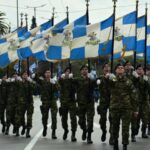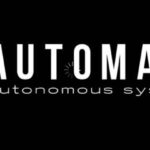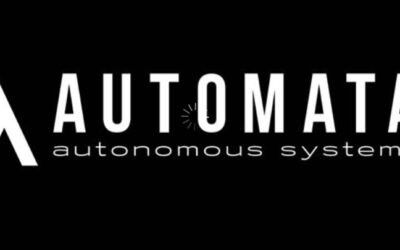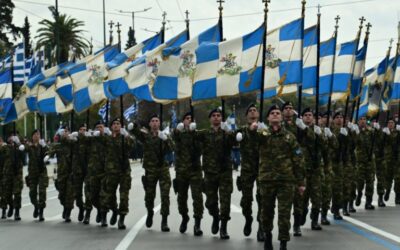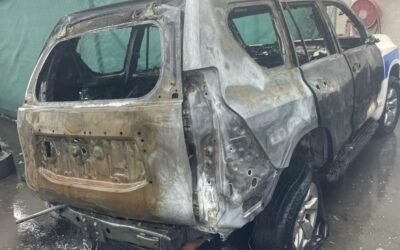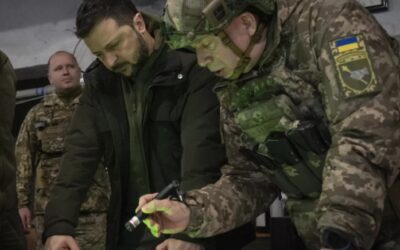QinetiQ has successfully trialled the UK’s first Manned-Unmanned Teaming (MUM-T) demonstration between a crewed aircraft and a drone.
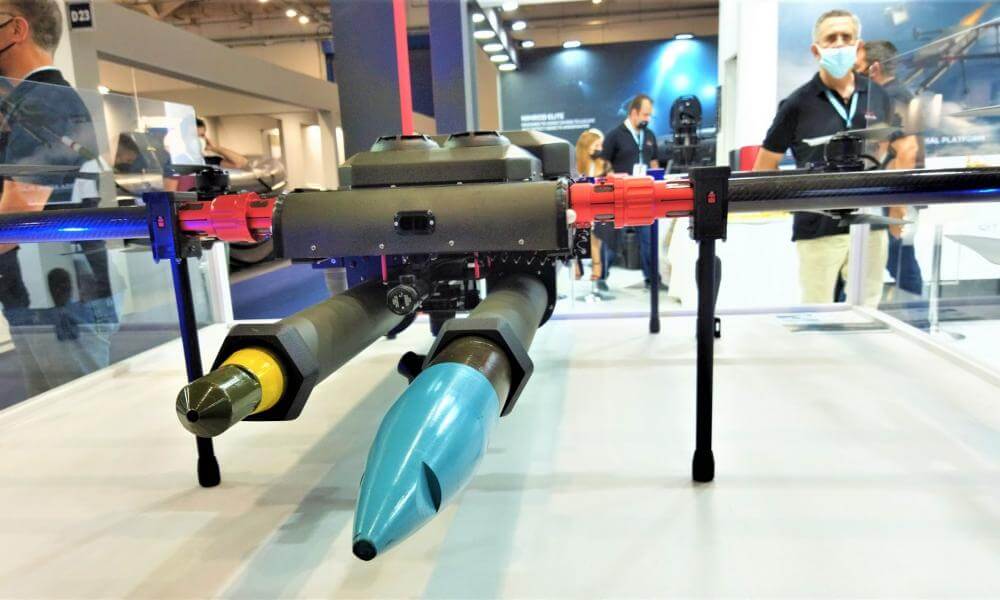
SAS Technology proudly announces the achievement of yet another milestone, as the UCAV SARISA successfully completed the second 2.75” aerial rocket fire testing.
This milestone achievement solidifies SAS Technology’s position as a pioneer in the development of state-of-the-art armed Unmanned Aerial Vehicles.

Key Facts about UCAV SARISA’s Weaponization Program:
- The Hellenic GDDIA supervises the testing campaign: The first Greek armed unmanned vehicle, UCAV SARISA, is being meticulously tested under the supervision of the Hellenic MOD’s GDDIA at its firing range, ensuring adherence to the highest standards of safety and precision.
- Dynamic Collaboration with the Hellenic Defence Systems (HDS): SAS Technology’s partnership with the HDS has been catalytic for the program’s success. The memorandum of cooperation currently in effect between the two companies has paved the way for groundbreaking innovations.
- THALES Group Support: The esteemed THALES Group, through its Belgian Business Unit (Thales Belgium), has provided unwavering support by supplying the test ammunition and issuing a UCAV SARISA certification document, for all the range of its 2.75’’ rocket series.
Their expressed intention to continue collaboration for testing their highly reliable and effective guided rockets (FZ275 LGR) further expands the program’s horizons.
As an attestation of the outstanding cooperation and results on the SARISA weaponization program testing, the THALES Group issued a public announcement on its website which can be accessed via the following link (click here).
Also read: SAS Technology | Firing of UAS SARISA with FZ-90 rocket (Hydra 70)
Results of the 2nd Aerial Rocket Fire Testing:
According to a relevant announcement, the second aerial test firing was conducted on 27-6-23 with utter success, fulfilling all of its objectives as described below:

Launcher inclination system: A new system designed to change the angle of the launcher in the vertical plane and assist aiming. It worked seamlessly during the test.
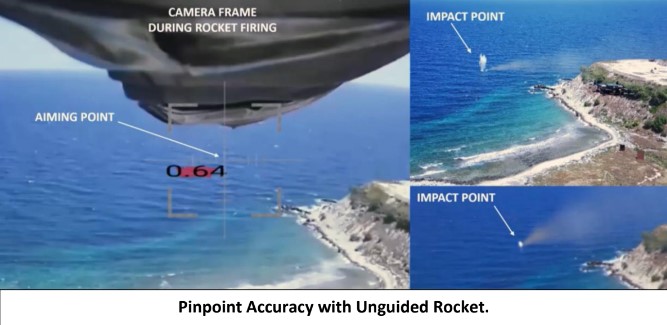
Aiming precision: Despite challenging wind conditions, with an average wind speed intensity of 12m/s (6+bft), the UCAV SARISA demonstrated impeccable aiming capabilities, hitting the aimed point (in relation to the coastline) with great precision.
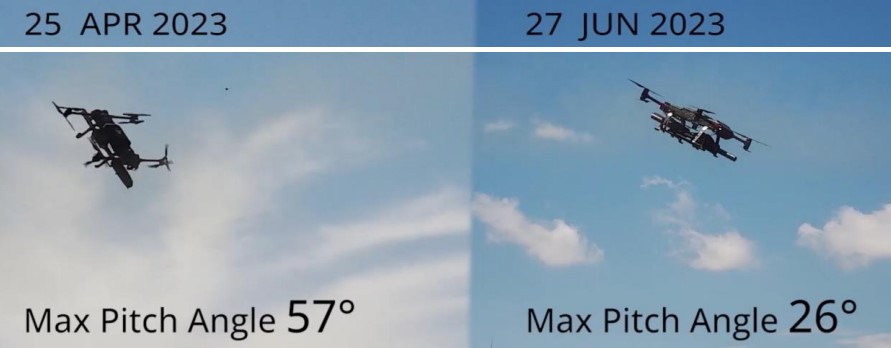
Reduced rocket recoil effects: Effective aerodynamic and mechanical enhancements, designed and implemented by SAS Technology’s experts, significantly mitigated the rocket’s hypersonic exhaust gas blast effects, ensuring enhanced stability and control during firing.
Next Steps:
With the successful completion of the development phase of the UCAV SARISA weaponization with 2.75’’ rockets, SAS Technology is gearing up for tactical operation testing using production models.
Informing the relevant Hellenic Special Forces Staffs: The Hellenic Special Forces Staffs that responded to SAS’ proposal for the presentation of its systems and capabilities have already been presented with the SARISA capabilities. They were also presented with all the programs the company has either in production or under development. Along with these presentations, some strategic proposals were also made by SAS, which involve cooperation with the Hellenic Special Forces to enhance the operational capabilities of existing systems in service.
Acknowledging Corporate Funding and Advocating for Special Forces Cooperation: SAS Technology proudly highlights that all achievements thus far have been made possible through corporate funding, underscoring its technological competence and innovativeness on international level. However, the company emphasizes that, besides the interest expressed by multiple international entities for collaboration in developing products that combine SAS UCAVS with their state-of-the-art defence systems, the significance of the Special Forces’ active participation and cooperation for the continued development and evolution of cutting-edge defence systems remains a crucial factor.
Future Firing Tests Under Realistic Operational Scenarios: SAS Technology has
proposed to the relevant Special Forces Staff to commonly conduct tests based on realistic operational scenarios using live ammunition. These tests are to encompass both unguided and guided rockets used in multiple operational scenarios and environments.
As SAS Technology celebrates the achievement of another successful milestone, the team remains steadfast in its commitment to pioneering groundbreaking advancements in the defence sector. The successful UCAV SARISA testing program underscores the company’s dedication to shaping the future of unmanned aerial vehicles in defence applications and bolstering its position within the international competition.
Also read: SAS Technology | Flight Testing of AIHMI Loitering Munition using UCAV SARISA as a carrier – VIDEO
READ MORE
Lambda Automata | Investment in UAV technology
Greek Lambda Automata has recently announced a major development that will strengthen its position in the defence industry.
Remote Modular Terminal | The US Space Force’s new weapon system
The US Space Force has unveiled its new Remote Modular Terminal (RMT) weapon system. The system has completed its…
Saint George | The Patron Saint of the Army and the Infantry
Saint George is one of the most prominent Saints of the Christian religion, not only of the Eastern Orthodox Church, but also of all…
QinetiQ | UK’s first Manned – Unmanned aircraft Teaming
QinetiQ has successfully trialled the UK’s first Manned-Unmanned Teaming (MUM-T) demonstration between a crewed aircraft and a drone.
Lambda Automata | Investment in UAV technology
Greek Lambda Automata has recently announced a major development that will strengthen its position in the defence industry.
Limassol | Firecrackers and fireworks spread chaos – Photos
The night of Holy Saturday in Limassol was eventful, as the Police and Fire Service faced a massive attack by a group of youths.
Georgia | Another session in two weeks on the controversial “foreign influence” bill
Thousands of protesters blocked a central intersection in the Georgian capital, Tbilisi, where protests against the controversial…
Russia | Volodymyr Zelensky is wanted
Moscow included the Ukrainian President on its wanted list, clarifying that the warrant for his arrest stems from an article of the…








